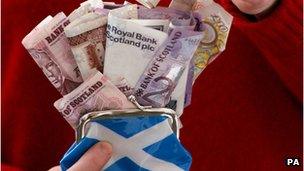Recent events and the road ahead
- Published

The Grangemouth deal came amid representations form Scottish and UK governments
Apologies for my somewhat dilatory approach to blogging over the past week or so. My only excuse is that I have been out and about; traversing the globe, even unto Dunfermline, Grangemouth and Edinburgh.
I know, I know. Modern technology would allow me to sidestep such challenges. Have you tried working a laptop while squatting in an edit van outside Dunfermline Abbey in the rain, keeping an eye out for parking attendants? Assuming, that is, I had remembered to bring the laptop and could get it to work. Well, quite.
Anyway, back in the dry now. Time to ponder the recent past - and to glance ahead. Grangemouth first. A remarkable volte face by the union, driven by a serious challenge from the company but also engineered, substantially, by major league political intervention, not least from the First Minister.
As I said, repeatedly, on the wireless and telly last week (if not online, see above), it is to the enormous credit of both the Scottish and UK governments that they set aside their very, very substantial differences over the future of Scotland to work together - and, more significantly, to eschew any attempt whatsoever to make political capital from the crisis.
To Dunfermline, next, and success for Labour. My congratulations to Cara Hilton upon her victory. (A simple formula which appeared to get rather lost in some quarters amid the instant recriminations and redefinition which followed this contest.)
To the winner, the spoils. Labour leaders are entitled to argue that the pendulum has shifted in their direction along with the swing which took Ms Hilton to victory.
Will there be a significant longer-term impact upon that much broader contest, the referendum? Very much doubt it. To be fair, Labour strategists acknowledge as much, privately.
White Paper
Which brings me to the referendum itself - and to the White Paper which, we now know, will emerge on the 26th of next month.
More, perhaps, anent that much anticipated document. Alex Salmond suggested at the SNP conference that the White Paper will feature two broad thematic areas: what we might call the structural (the monarchy, a written constitution, independent control of tax and spending); and those areas that are governed by policy (what might be done with tax powers, for example).
If you like, these two thematic areas match dates. The structural falls into the 2014 camp - that is, the issues which are specifically determined by popular choice at the 2014 referendum, subject of course to negotiation with the UK Government and a subsequent Westminster Bill to effect independence.
The other elements might be categorised as 2016 matters: those issues which depend upon the colour of the government which emerges from the first post-independence Scottish election. For the avoidance of doubt, 2016 is the target date named by the SNP for those elections. Others say it might take longer.
So, for clarity, a Yes vote in 2014 would result in the transfer of full tax powers to Scotland. But it is the outcome in 2016 which determines how those tax powers are used, whether tax as a proportion of GDP goes up, down or remains static.

Money matters will form part of the bigger and smaller picture in the White Paper
I understand, however, that the White Paper will thread these thematic areas throughout the document as a whole.
Similarly, the various elements of the White Paper - including the policy elements - might be defined as falling into three broader categories: those matters which are intrinsic to independence; those matters which require cross-border or wider negotiation; and those matters which are subject to political and governmental choice.
Into the first category, for example, might fall that issue of control of the broad economy. Scotland would be an independent state, controlling tax and spending and taking the consequences, up or down.
In the second category, one might place membership of the EU and Nato plus retention of the pound as part of a common currency zone. Scottish membership of the EU would require consent from other member states, membership of Nato consent from… you get the concept. In each case, that fact will be acknowledged (we have moved on from claims of automatic assumption) - but it will be argued that Scotland's accession would be welcome, not least to address the interests of other nations.
In the case of the currency, ditto. It will be acknowledged that the rUK government and the Bank of England would require to consent - but it will be argued that it would be in the economic interests of those authorities to maintain stability, based upon the calculation that Scotland could use sterling unilaterally anyway. In effect, although this will not be stated in those terms, unilateral use is Plan B or, more precisely, a negotiating standpoint.
In the third category will be those issues which are wholly determined by post-independence policy and, of course, prevailing circumstances, such as the level of taxation.
Referendum 'prospectus'
In terms of actual content and lay-out, the WP itself will fall into four broad sections.
There will be an opening section, the big picture. This will set out the broad case for independence. (Remember that this document will form the prospectus upon which the people of Scotland will be asked to cast a verdict at the referendum.)
There will then be a detailed policy section, dealing with issues arising from independence and seeking to provide answers to questions such as the economy, taxation, the future of pensions, the future of welfare etc etc etc. This, I guess, will be the section which will attract most attention.
As you might imagine, the proclaimed gains of independence will feature in this section, including monetary gains for the citizens. We have already heard traces of this, at the SNP conference and elsewhere. Nicola Sturgeon's promise to cut fuel bills, for example.
Tempting though it is, I understand that the White Paper will not draw up a composite ready reckoner. ("Vote Yes and look what you get!") Tempting because of the polls suggesting that Scots would go for independence if they could be guaranteed to be £500 better off annually.
However, Nationalist thinkers say that the £500 figure is an arbitrary choice by pollsters and analysts. They say further that a composite calculation in the White Paper would be "too crude." Leave that one to the wicked media, then?
Scottish state
Thirdly, the transition to independence will be traced: the route by which a Yes vote would be translated into establishing an autonomous Scottish state.
Again, there is contention here. Nationalists tend to stress the primacy of the White Paper, presuming that it is endorsed in the referendum. In this regard, they note the Edinburgh Agreement which committed both governments to respect and implement the verdict of the Scottish people.
Unionists remind us that the White Paper would be only the start of the formal process, that there would have to be cross-border negotiations and legislation at Westminster to dissolve the Union. Edinburgh's statement of respect meant just that: respect. It did not mean that the Nationalists could expect to get everything they demand, even with a generic popular endorsement.
Fourthly, there will be a conclusion. Can you guess what that might be? Correct. Give that reader a furry toy.
Scottish Government strategists say that the emphasis throughout the White Paper will be upon addressing popular concerns. This does not mean that every question will be answered in every detail. Not because of endemic badness but because not every answer can be given.
No politician can offer absolute certainty about the economic future of any global zone for a period years hence.
But the WP will set out to address key topics within the ambit of independence and subject to the intrinsic uncertainty of this troubled world.
Final thought. Those drafting the White Paper describe the stance which underpins their efforts. To reassure the sceptical but open-minded public. Not to convince their political opponents. That they regard as a truly lost cause.